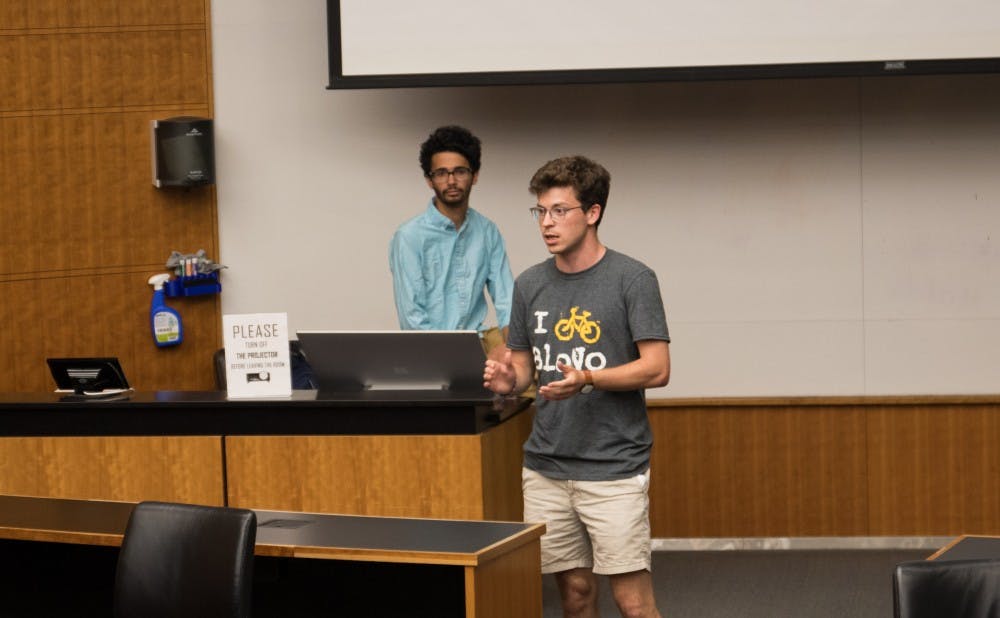Not interested in sororities, fraternities or selective living groups? Meet a new possible type of organization—the selective social group.
At Wednesday's Duke Student Government Senate meeting, senators debated legislation to charter the Hyde House, a selective social group seeking to provide an alternative to selective living groups on campus.
The group was seeking approval from the Senate as a non-residential social group, with the power to collect annual dues from its members.
However, senators expressed a desire for more information from the organization on its purpose and events before chartering a group that several senators argued would set a new precedent for social organizations on campus.
"It might be the first of its kind and it's really important for it to be fully fleshed-out before its introduction," said junior Uwa Ihionkhan, vice president for Durham and regional affairs, after the session.
The Hyde House was approved for chartering by the Student Organization Financing Committee in a four-to-three vote. Chair Ben Hubsch, a senior, cast his vote in favor to break the deadlock.
According to Hubsch, dissenting members argued that the group would not fill a remaining niche on Duke's campus, and that they did not offer satisfactory evidence that they would transition away from a single group of friends to a broader audience. This was the group's second appearance in front of SOFC. They were rejected on their first attempt, which included a request for housing.
Several senators asked for more information before voting on the legislation. President Pro Tempore Avery Boltwood, a junior, granted a brief recess to allow Senators more time to review the proposed constitution for the Hyde House.
"I am now realizing that I wish that they hadn't called themselves a selective social group," said Hubsch, in response to questioning about the group's rush process, as well as the niche that it would fill.
However, he emphasized the need for the group as an alternative to existing living groups on campus.
"You're going to be hard pressed to find a group that has a social purpose outside of selective living groups and fraternities," Hubsch said.
Ihionkhan presented a negative speech on the potential charter, arguing that more in-depth legislation is still needed regarding the purpose and campus role of the Hyde House.
The Senate unanimously passed a motion to table the legislation until Sept. 19, to allow time for at-large Senators to be seated.
In other business:
The Senate unanimously chartered the Duke Rotaract Club. The group will focus on local and international service, and is a partner organization of Rotary International, which counts 1.2 million members globally.
“There is no doubt in my mind that this will be sustainable,” Hubsch said.
The Senate approved a total of $25,865 in funding for five student organization events. Zeta Tau Alpha was funded $7,500 for a speaker event on discrimination in campus Greek Life. However, Jake Sheridan, a sophomore and contributing reporter for The Chronicle, and Liv McKinney, a junior, questioned the timing of the event, which is scheduled around both election day and a Duke men's basketball game against Kentucky in the Champions Classic.
The Interfraternity Council received $8,500 towards a philanthropic concert expected to draw 1,000 attendees, alongside $10,000 of funding from other sources. Peer Advocacy for Student Health received $5,270 for a speaker event expected to draw around 60 people, while the Muslim Students Association received $2,295 for their annual fall banquet. The Senate also funded Singapore Students Association's annual Mid-Autumn Festival for $5,270.
President Kristina Smith, a senior, sought nominations from senators for university committees reporting to President Vincent Price. Smith, along with Executive Vice President Jake Hoberg, a junior, sat on the Campus Sustainability Committee last year.
Chief of Staff Steve Hassey, a senior, gave a presentation to the Senate on this year's shift away from email for internal Senate communications. Instead, the Senate will use the online collaboration service Slack.
Get The Chronicle straight to your inbox
Sign up for our weekly newsletter. Cancel at any time.
“I love Slack,” Hassey said. “I think it’ll be a really productive way for people to think about projects.”
The Senate unanimously approved a statute to provisionally forgive $4,573.59 of debt accrued by Duke Diya, the result of the accidental charging of the organization’s account, rather than the organization’s Cultural Engagement Fund allocation. The statute was approved with an amendment from junior Saheel Chodavadia, vice president of academic affairs, mandating additional training for Duke Diya's next treasurer.
Senators Jake Satisky and Jia Jia Shen, both sophomores, were approved to the Senate Internal Affairs Committee. Satisky is also a university news editor for The Chronicle.
Editor's note: This article was updated Thursday morning to reflect that Duke Diya's debt was provisionally forgiven, rather than forgiven. The Chronicle regrets the error.
Carter Forinash, Trinity '21, was the news editor for The Chronicle's 116th volume.

